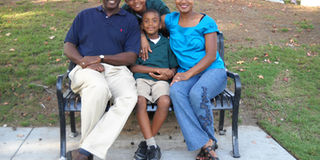Children learn how to love from their parents

Moses Wilson, the Unaa president and his family. Happy parents will have happy children who will turn out to be jolly spouses. Children learn to love from their families, from what they see, and this contributes to the success or failure of their relationships in future.
What you need to know:
The way a couple expresses love to each other is no exception. The same way a child does not speak words he has never heard, is the same way he’ll not automatically turn into a sensitive husband who treats women with respect and love.
Those seemingly small loving gestures and kind words spouses share in their marriage will all come to life the minute their children enter a relationship of their own, writes Agnes Namaganda.
Breeding affects so much of what children grow to become as adults. The way a couple expresses their anger, frustration and happiness all become blue prints that are later replicated by their children. If the words ‘please’ and ‘thank you’ are often used in the home, children will grow up with those words on their lips. And if it’s ‘what the hell’ and ‘damn you’ it will be that, properly combined with the very facial expressions and tone used, and in a similar situation.
The way a couple expresses love to each other is no exception. The same way a child does not speak words he has never heard, is the same way he’ll not automatically turn into a sensitive husband who treats women with respect and love. Those seemingly small loving gestures and kind words will all come to life the minute your child enters a relationship of their own.
Beatrice Kakembo of Inspirations Counselling Centre argues that more often than not, children soak in the way their parents treat and relate to each other and take it on as the right way of expressing intimacy. And because when it comes to intimacy the results of what they have learnt cannot be determined till much later on, parents should be careful to model the right thing as a guide for their children’s love relationships in future. “Children learn to love from their families from what they see, and this contributes to the success or failure of their relationship in future,” she asserts.
“There are so many adults who, because they have never learnt how to love or what it is, are traumatised by affection. Haven’t you seen a man who loves a woman so much but does not know how to express it?” she asks. “He might buy her a car, give her lots of money for shopping and do countless other things to show that he loves her. If the woman still expresses her dissatisfaction, because maybe she wants some quality time, just to talk and be affectionate with her man, the man may get confused and if he doesn’t do “more things”, he’ll get irritated at her and wonder what exactly it is this woman wants from him.”
Kakembo argues that what most men perceive as loving their wives isn’t it at all. Buying your wife a gomesi or paying school fees for her children and buying food for the home aren’t signs of love because that’s your responsibility.
Well, this does not mean kissing and public displays of affection that should be a reserve of the bedroom. She gives an example of the way women, especially here in Africa, fuss over daddy’s plate, daddy’s bathing water, daddy’s food and the like, as signs of love towards that man.
“Men should also consciously and deliberately do the same when it comes to their wives.” She says, this will show the children that love is a two-way street and that if you love someone, you thoughtfully and caringly do things for them which do not necessarily involve money. Otherwise boys in such homes might grow up with the misconception that it is only men who should be pampered while the girls might think that women are supposed to give, give and give without receiving.
Even when it comes to your children, it is important that you go beyond the basics of providing school fees and buying uniforms. Tell the children that you love them, do small things that show you were thinking about them. “Children will be able to see and feel it, and will be able to tell whether someone loves them or not. Otherwise your offspring can turn into cold people who are ambushed by love and you might be abused later in life just because someone told them s/he loved them,” the psychologist advises.
It is therefore important that a couple that wants to see a certain quality of intimacy in their children’s relationships, purposely and deliberately model love to each other before their children. Because if you never let your children see you love each other, they might not understand it and this will leave them ignorant, confused and probably abused later in life.




